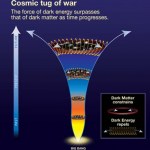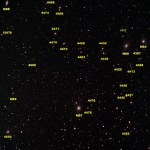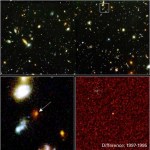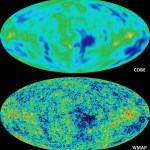dark energy
The last 100 years have brought us from a Universe no bigger than the Milky Way ruled by Newton's gravity to a vast, expanding one with hundreds of billions of galaxies, covered in dark matter, beginning with the big bang, which was likely caused by inflation, and which will end in a freezing cold death as the galaxies accelerate away from one another, off into infinity. We gained and confirmed a new theory of gravity; we learned how all the elements in the Universe were made. We detected neutrinos from an exploding star hundreds of thousands of light years away. And we walked on the Moon.…
By the 1990s, we knew an awful lot about the Universe. You can check out what the greatest discoveries were (in my opinion) from the 1910s, 1920s, 1930s, 1940s, 1950s, 1960s, 1970s, and 1980s. By this point, we understood the origin of the Universe as well as we understand it today, knew about dark matter and normal matter, and were trying to figure out what the fate of the Universe was. It started with a bang (of course), with a supremely hot (~10^20 degrees), dense, and rapidly expanding state (image courtesy of Stephen van Vuuren):
We knew that there were (and are) two things going on,…
So as a full member of both the American Astronomical Society and the American Physical Society, I get sent issues of the magazine Physics Today. Well, I was going through the April issue, when I saw this article:
Cosmic Sound Waves Rule
by Daniel J. Eisenstein and Charles L. Bennett
That first name sounds familiar. Why? Because he's my boss! The article requires a subscription, but seeing as how this is what my research is, why don't I tell you what the big idea is.
The Universe is full of dark matter, normal matter, and radiation. When it's young, the radiation is more important than matter…
So, what's the deal with this one? startswithabang.com reader Scott Stuart asks the following question:
I was reading "The First Three Minutes" last night and came across an
interesting section about blackbody radiation and energy density. The
author states that as the universe expands, the number of photons
running around (in the CMB, for example) is unchanged, but their
wavelengths get stretched. The energy in a photon is, of course,
inversely proportional to its wavelength, so the energy content of a
photon decreases as its wavelength increases. That seems to mean that
the total energy…
In a comment on my last post, What is Dark Energy, Kendall asks the following, which is such a good one I think it deserves its own post:
I thought the expansion was accelerating? Aren’t you saying that it is on its way down to 85% of its current rate? Sounds like expansion is slowing, but still leaves us with an open universe…
People do say the expansion of the Universe is accelerating. But that doesn't mean that the expansion rate is accelerating. It means that if you take a look at any one galaxy that isn't gravitationally bound to us in the Local Group (that is, any big galaxy that isn't…
You've all heard these words before. Dark Energy. But what is it, and why are we stuck with it? Let me start by telling you a story.
Imagine, for a minute, that you have a candle. You know everything about this candle, including how bright it is and how far away it is from you. Like so:
Now if I move this candle twice as far away, I know it's going to be one-fourth as luminous. If I move it three times as far away, I know it's going to appear one-ninth as luminous. And if I move it a thousand times farther away, I know what I see is going to be one-millionth as luminous as the original…
Aaah, the Virgo cluster. A huge cluster of hundreds of galaxies, and our closest large neighbor in the Universe. People have known for a long time that although Virgo is still redshifting away from us, it isn't quite as fast as we would expect from the Hubble expansion rate of the Universe. Does this mean that we're gravitationally bound to it, and some day, we'll move into this dee-luxe apartment in the sky?
Nope. Dark energy is here to push it away from us, and we'll unfortunately see this bright neighbor recede farther and farther from us, until it disappears from our sight. So say your…
Sure, there's dark energy, but what does that really mean? First off, there's the bizarre phenomenon we see: very distant objects appear dimmer than we expect in a Universe filled with just matter and space. This supernova (above) should appear much brighter for how distant it is, based on what we know about supernova. This means one of three things are going on:
Supernova were intrinsically different when they were younger, and inherently fainter.
Some type of dust is blocking the light from distant supernova, making them seem fainter.
These supernova are actually farther away than we had…
The cosmic microwave background is the radiation left over from the big bang. It's very uniform, 2.725 Kelvin everywhere. We're moving with respect to it, so there's a doppler shift, and we see that as a dipole moment in the Temperature. When we subtract that out, we see variations on the order of 30 microKelvins! WMAP is a satellite (Wilkinson Microwave Anisotropy Probe) that measured these anisotropies, and they just released its year 5 data. First off, with the uniform and dipole parts subtracted out, and with the foreground from the galaxy also taken out, here's the map of the microwave…
startswithabang.com reader Andy has a great follow-up to his question on the Age & Size of the Universe, and asks:
why does the CBR “appear” to come from a light sphere that “appears” NOW to be larger than the universe WAS when it first set off in a straight line on its 13.4 billion year trip???
The "CBR" stands for "Cosmic Background Radiation," and it refers to the (presently) microwave background. Here's why Andy's question is actually profound, and was known for about 20 years as either the homogeneity problem or the horizon problem. The problem is that, when we look up at the sky,…
Let me set the scene for you: I'm fresh off my Ph.D., teaching introductory physics at the University of Wisconsin. I'm trying to demonstrate how to turn potential energy into kinetic energy, and so I ask this simple question:
What is Energy?
And I get a stunned silence back from the room. One of those silences where 25 faces look back at you with eyes that say, "no, you're the one teaching us; you need to answer that one!"
And I confess, this is one of those questions that's looks like the easiest thing in the world, and yet there's no good answer for it. Put simply, energy is possibly…
Three awesome things are going on today for you, and I invite you to check them all out:
The latest Carnival of Space is live, where you have your choice of 23 different astronomical topics to choose from. Of course, my post this week on galaxies and how they're made is on there, too!
Pamela L. Gay, cohost of Astronomy Cast, blogger of Star Stryder and all-around great person, saw a press release this week about whether we need dark matter and dark energy. The answer, of course, is yes, but since I'm an expert on that stuff, she came to me and asked me to give my analysis of the…
Dave, one of my online chessplaying buddies, asked me this question (edited for appropriateness):
Now this speeding up of the expansion of the universe: Do I understand correctly that one of the theories to explain why relates to "dark matter"?
In real simple terms, what in the dark blue blazes is dark matter, and why and how (and I think the "how" is what keeps you boys up late at night) does it cause this increase in speed?
So Dave gives me the opportunity to, first off, make the distinction between dark matter and dark energy.
Dark matter is, quite simply, matter that doesn't emit…
(I know I'm not doing this any more, but I couldn't resist.)
An article in New Scientist reports on musing by two reasonable and respected cosmologists— indeed, ones whom I've met myself— that our discovery of dark energy may have shortened the life of the Universe.
To which I can only say "foo". And I say "foo" on two levels. Primarily, on the sensational way in which this is described by New Scientist. But secondarily, on the interpretations of quantum mechanics that respectable cosmologists are promoting.
First of all, for a bit of perspective. The actual research paper on which this…









